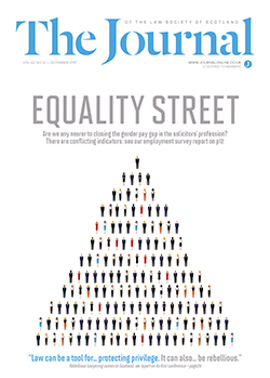Spending means savings: legal aid study

We know that legal aid helps people during some of the most difficult times in their lives, whether they are going through family breakdown, facing eviction or have been accused of a crime.
However new, independent research has shown it also has a positive impact on our society as a whole.
The research, which has been supported by charity Shelter Scotland and carried out by independent researchers Rocket Science, is the first of its kind in Scotland. The results show that in addition to being able to access professional legal advice, additional benefits for recipients include positive family relationships, better job prospects and better mental health.
Having also considered the impact on taxpayers and public services, the study indicates that every person in Scotland benefits from legal aid because of the positive financial impact on the NHS, local authorities, courts and prisons.
The findings come at a crucial time, as the Scottish Government’s review of legal aid is underway. We have shared the research findings with Martyn Evans, who is chairing the review group, as well as the Scottish Legal Aid Board and members of the Scottish Government.
The results illustrate the overwhelming case to be made for the significant long-term benefits of having a properly resourced legal aid system which ensures access to justice for all, regardless of where they live or their financial situation. This is why we continue to be extremely concerned at the cuts in legal aid spending in Scotland. There has been another drop this year – with less spent now than 20 years ago.
We will therefore continue to impress upon ministers, Scottish Government and the Scottish Legal Aid Board, as well as the legal aid review group, that if cuts to legal aid spend continue, there is a worrying possibility that increasing numbers of solicitors simply will not be able to provide it in the future and people will lose access to professional legal advice in their local area. We will press for the Scottish Government to use these findings as the basis for further research into the wider benefits of investing in legal aid.
Benefits of legal aid – key findings
Rocket Science found that for every £1 spent on legal aid in each of the areas of criminal, housing and family law, the overall benefit gained by the person receiving the legal advice funded by legal aid and wider society was, in many cases, valued at substantially more than £1.
The key research findings show that:
- In housing cases, with issues regarding tenancy or mortgage such as evictions due to rent arrears, spending £1 on legal aid can generate a beneficial return of approximately £11 for both the individual and wider society. Here, 80% of the legal aid spent in a case benefits the individual, due to fewer evictions and cases of homelessness, and 20% benefits public services including the NHS and local authorities, with reduced demand for health and social services.
- For every £1 spent on legal aid in family cases, which include issues regarding finances, child contact, or residence following divorce or separation, there is a beneficial return of approximately £5. Here, 95% benefits the individual in helping to ensure access to justice, with the person not having to represent themselves in court, while 5% benefits public services, including the Scottish justice system, with more cases resolved outwith the court.
- For every £1 spent on legal aid in criminal law cases, there is a beneficial return of approximately £5. Here, 90% benefits the individual with the main benefit being securing professional representation from a solicitor in legal proceedings, and 10% benefits public services including the justice system, courts and prison service due to earlier resolution of cases.
The social return on investment analysis
The social return on investment (SROI) analysis has:
- investigated and measured the financial, economic and social impacts of spending on legal aid;
- identified the main beneficiaries (which covers all individuals and/or organisations that are impacted by legal aid);
- placed a financial value on each impact (the research does not assess the efficiency and effectiveness of the administration of legal aid, or its current eligibility criteria).
Social return does not necessarily equate to financial savings to services, or that there is a direct financial return. The calculations include social impacts without direct market value, but the researchers have expressed this value to the beneficiaries in financial terms. It is important to read the analysis within the context of all of the impacts, quantified and unquantified. Rocket Science could not quantify all of the possible benefits to individuals and wider society to the same extent across all three areas, and was able to evidence and quantify many more impacts in housing cases than in family law and criminal cases.
Continuing the dialogue
Thank you to all of the solicitors and other organisations who took part in the research. It is part of ongoing dialogue about the future of legal aid in Scotland, and we encourage all of our members to get involved and to let us know their thoughts, by sharing on social media using #DefendLegalAid and tagging us @Lawscot on Twitter, or writing to us at legalaid@lawscot.org.uk
The full report, and a summary report, can be found on the Society’s website here.
Case Study
Steven, a client of Shelter Scotland Housing Law Service, faced eviction from his council house due to rent arrears and was able to get legal aid funding for legal representation.
He said: “If I hadn’t had access to the Shelter Scotland Law Service through legal aid I wouldn’t have known half the court procedures I needed to understand to avoid eviction.
“The knowledge the solicitor gave me helped me to stop panicking and to realise that I was at the start of a process and if I took the right steps I had time to take control of the situation and to save my home. I was only able to do that because of the charity’s advice. There’s very little legal advice available to people without having to pay up front. Legal aid is a life saver.
“If that help wasn’t available I would have been on the streets by Christmas.”
Legal aid spending down another £2 million, SLAB annual report reveals
Legal aid cost the Scottish taxpayer £135.7 million in 2016-17, down £2.1 million on the previous year, the annual report of the Scottish Legal Aid Board has revealed.
The report discloses a fall in civil legal aid spending in the year to 31 March 2017 from £34.16 million to £30.72 million, civil advice and assistance and ABWOR marginally down at £18.44 million, summary criminal legal aid also slightly down from £29.81 million to £29.36 million, but solemn criminal legal aid up from £36.34 million to £37.46 million. Children’s legal assistance rose 6% from £5.1 million to £5.4 million. Grant funding by SLAB fell from £7.8 million to £6.26 million.
Total civil spending, net of operating income which fell by more than £2 million, was down from £47.77 million to £44.73 million, while total criminal assistance rose from £84.35 million to £85.06 million. Total administration spend fell from £12.22 million to £11.75 million, largely due to higher than normal pension costs in the previous year.
The figures given are for legal aid cash spend, the basis on which funding is received from the Scottish Government. After accounting adjustments, including depreciation, accruals and prepayments, the statement of comprehensive net expenditure shows a net cost of operations of £129.9 million (2015-16: £130.2 million).
The legal aid budget for 2016-17 was £126.1 million.
Since 2010-11, annual spending has fallen from a high point of £161.4 million.
SLAB chief executive Colin Lancaster commented: “2016-17 has been a year of good performance for the organisation during a continued period of organisational change and a complex external environment.
“We developed a new three-year corporate plan, which takes us up to March 2020. As part of this process, our board agreed new strategic objectives for the organisation.
“The plan focuses on operational excellence, with a vision that we will transform the administration of legal aid.
“Although a significant focus of the corporate plan is on our internal operations and culture, everything that we do in pursuance of it will also aim to deliver positive outcomes for those seeking, accessing, and delivering legal aid.”
The board reports that for its main functions of taking decisions on legal aid applications and assessing and paying the accounts of solicitors and counsel, it met or exceeded all but one of its headline performance indicators for the year.
An independent review of the legal aid system in Scotland, led by Martyn Evans, is due to report in spring 2018.
First reported on the news page of www.journalonline.co.uk
In this issue
- GDPR: do you need a data protection officer?
- Prospectus to buy into
- From Milngavie to the Middle East
- Devolution after the Brexit hurly burly
- Reading for pleasure
- Opinion: Janys M Scott
- Book reviews
- Profile
- President's column
- Forward from a landmark year
- People on the move
- Equality: is it practised?
- Alcohol pricing: a measured response?
- Private tenancies: rebalancing or just upheaval?
- Spending means savings: legal aid study
- Too late, too late?
- RebLaw Scotland – join the rebellion
- Sentences: having the last word
- Insolvency and jurisdiction update: stating the obvious?
- When threats are OK
- Enter yet another tenancy
- Rights of the funded
- Registration rejections – more than formalities
- Heritage holder
- Public policy highlights
- Society's first MOOC opens legal learning to all
- Where there's a will...
- Resolution for the new year
- Q & A corner
- A year to accredit
- Dilapidations: the pitfalls
- Scaling the depths
- Equality: a matter of choice?






